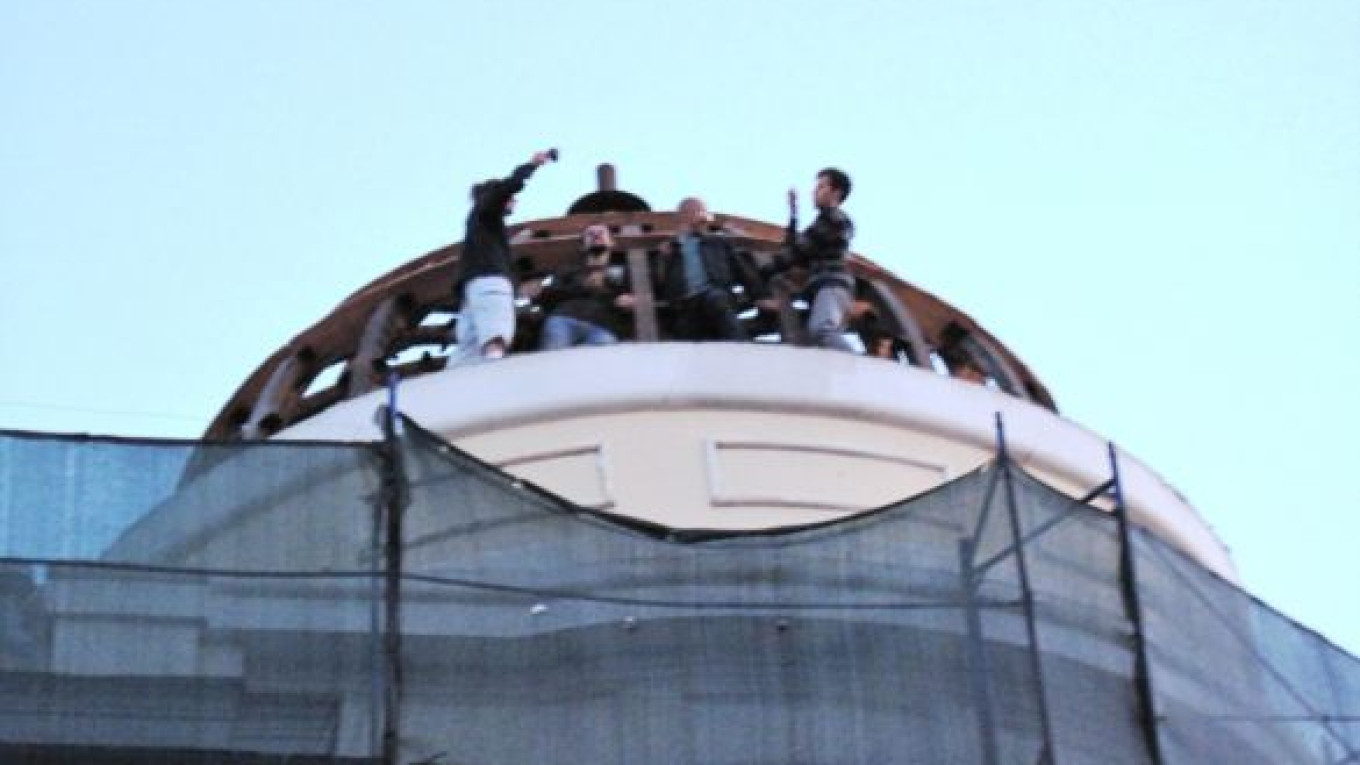Three activists from the architectural preservation group Arkhnadzor spent Monday night on the roof of the Bolkonsky House, physically defending the building's cupola from an approaching crane.
The group is now calling on Sobyanin and the Moscow government to put an end to what they consider to be the illegal destruction of a historic monument.
Police escorted Arkhnadzor coordinator Rustam Rakhmatullin and two activists to their offices on Arbat on Tuesday morning, after which work continued at the Bolkonsky House. The activists were released around 4 p.m. with no indication as to whether they would be charged.
According to Arkhnadzor's website, the group acquired a document from city authorities on March 11, confirming that: "The demolition of the Bolkonsky house has occurred in the complete absence of authorizing documents." The injunction ordered that construction on the house be ceased and violations rectified.
The group is now claiming that "100 days without a warrant" have passed.
The group believes that a similar injunction was filed on June 17 after two workers were injured when sections of the building's cornice fell during removal. The construction began again four days later.
This is just the latest in Arkhnadzor's series of attempts to prevent the Center for the Development of Personal Relations from adding two additional stories to the historic location on Vozdvizhenka 9.
The Bolkonsky House was removed from Moscow's list of protected cultural objects in 2009. However, Arkhnadzor says it is located in a protected architectural zone, putting the building under special regulations that prohibit substantially altering the original structure.
Groups within the state government have objected to the reconstruction. The Ministry of Culture refused to approve the plan in February, and on April 23, 18 deputies of the state Duma appealed to Moscow mayor Sergei Sobyanin to stop the builders.
On April 19, Arkhnadzor coordinated an open letter to Sobyanin, collecting the signatures of over 200 eminent cultural figures and 3000 concerned Muscovites.
The Bolkonsky House is famous for its connection to Lev Tolstoy, whose grandfather Nikolai Volkonsky lived in the house from 1816 to 1821. Tolstoy himself visited the house on many occasions and even mentioned it in the classic "War and Peace" as the home of the character Prince Andrei Nikolaevich Bolkonsky.
According to Arkhnadzor, construction began on March 9 of this year and was halted when activists called the police, only to begin again as soon as the authorities left. This pattern of events repeated itself on numerous occasions over the subsequent months.
Despite the damages already sustained to the original structure, Rakhmatullin insisted in an interview with Gazeta.ru on Tuesday that the building could still be saved.
"We expect, that in view of recent events … the single possible decision will at least be reached — to save this building, which objectively constitutes a monument, even if it was intentionally taken from protection four years ago. It isn't too late to save its image from the intersection of the street and side-street."
Contact the author at artsreporter@imedia.ru
A Message from The Moscow Times:
Dear readers,
We are facing unprecedented challenges. Russia's Prosecutor General's Office has designated The Moscow Times as an "undesirable" organization, criminalizing our work and putting our staff at risk of prosecution. This follows our earlier unjust labeling as a "foreign agent."
These actions are direct attempts to silence independent journalism in Russia. The authorities claim our work "discredits the decisions of the Russian leadership." We see things differently: we strive to provide accurate, unbiased reporting on Russia.
We, the journalists of The Moscow Times, refuse to be silenced. But to continue our work, we need your help.
Your support, no matter how small, makes a world of difference. If you can, please support us monthly starting from just $2. It's quick to set up, and every contribution makes a significant impact.
By supporting The Moscow Times, you're defending open, independent journalism in the face of repression. Thank you for standing with us.
Remind me later.


